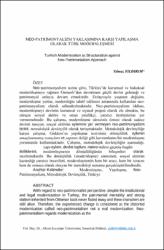| dc.contributor.author | Yıldırım, Yılmaz | |
| dc.date | 2012 | |
| dc.date.accessioned | 2015-04-06T10:23:16Z | |
| dc.date.available | 2015-04-06T10:23:16Z | |
| dc.date.issued | 2012 | |
| dc.identifier.issn | 1302-1265 | |
| dc.identifier.uri | http://hdl.handle.net/11630/3658 | |
| dc.description.abstract | Neo-patrimonyalizm tezine göre, Türkiye’de kurumsal ve hukuksal
modernleşmeye rağmen Osmanlı’dan devralınan güçlü devlet geleneği ve
patrimonyal anlayış devam etmektedir. Dolayısıyla yaşanan değişim,
modernleşme yerine, modernliğin tahrif edilmesi anlamında kullanılan neopatrimonyalizm
olarak adlandırılmaktadır. Neo-patrimonyalizm iddiası,
modernleşmeyi devletin kurumsal ve siyasal projesi olarak ele almakta, bu
süreçte sosyal aktöre ve onun yenilikçi, yaratıcı üretimlerine yer
vermemektedir. Bu çalışma, modernleşme sürecinin öznesi olarak sadece
devleti tanıyan, sosyal aktörün eylemine yer vermeyen neo-patrimonyalizm
tezini, metodolojik devletçilik olarak tartışmaktadır. Metodolojik devletçiliğe
karşın çalışma, Giddens’ın yapılaşma teorisinin dönüşlülük, eylemin
amaçlanmamış sonuçları ve yapının ikiliği gibi kavramlarını bir
modernleşme yorumunda kullanmaktadır. Çalışma, metodolojik devletçiliğin
aşamadığı, yapı-eylem, devlet-toplum, makro-mikro geçmiş-bugün
ikiliklerini, modernleşmenin dönüşlülüğünün bileşenleri olarak
incelemektedir. Bu dönüşlülük (modernleşme) sürecinde, sosyal aktörün
kazandığı yaratıcı becerileri, modernleşmenin hem bir aracı, hem bir icracısı
hem de sonucu olarak okuyan bir metodoloji sunumu gerçekleştirilmektedir. | en_US |
| dc.description.abstract | With regard to neo-patrimonialist perspective, despite the
institutional and legal modernization in Turkey, the patrimonial mentality
and strong statism inherited from Ottoman back never faded away and these
characters are still alive. Therefore, the experienced change is considered as
the distorted modernization called neo-patrimonialism not a real
modernization. Neo-patrimonialism regards modernization as the institutional and political project of the state and ignores social agent with all
its innovative, creative activities. This paper discusses neo-patrimonialist
perspective, which sees the state as the mere actor and guide of
modernization, excludes activities of social agent, as methodological statism.
Opposed to methodological statism, this paper offers Giddens’s structuration
theory with its constituent concepts like reflexivity, unintended
consequences of action and duality of structure as the interpretative tools of
modernization. This paper analyzes the dichotomies structure-agency, statesociety,
macro-micro, past-today as the basic elements in reflexivity of
modernization and claims that methodological statism can not transcend
them. In this paper, an alternative methodology that considers creative
acquisitions of the social agent in the process of this reflexivity
(modernization) are both the tools, performers and consequences is
presented. | en_US |
| dc.language.iso | tur | en_US |
| dc.publisher | Afyon Kocatepe Üniversitesi | en_US |
| dc.rights | info:eu-repo/semantics/openAccess | en_US |
| dc.subject | Modernlesme | en_US |
| dc.subject | Neo-Patrimonyalizm | en_US |
| dc.subject | Yapılaşma | en_US |
| dc.subject | Metodolojik Devletçilik | en_US |
| dc.subject | Türkiye | en_US |
| dc.title | Neo-Patrimonyalizm Yaklaşımına Karşı Yapılaşma Olarak Türk Modernleşmesi | en_US |
| dc.title.alternative | Turkish Modernization as Structuration against Neo-Patrimonialism Approach | en_US |
| dc.type | article | en_US |
| dc.relation.journal | Sosyal Bilimler Dergisi | en_US |
| dc.department | Afyon Kocatepe Üniversitesi, Fen-Edebiyat Fakültesi, Sosyoloji Bölümü | en_US |
| dc.identifier.volume | 14 | en_US |
| dc.identifier.startpage | 1 | en_US |
| dc.identifier.endpage | 22 | en_US |
| dc.identifier.issue | 1 | en_US |
| dc.relation.publicationcategory | Makale - Uluslararası Hakemli Dergi - Kurum Yayını | en_US |



















